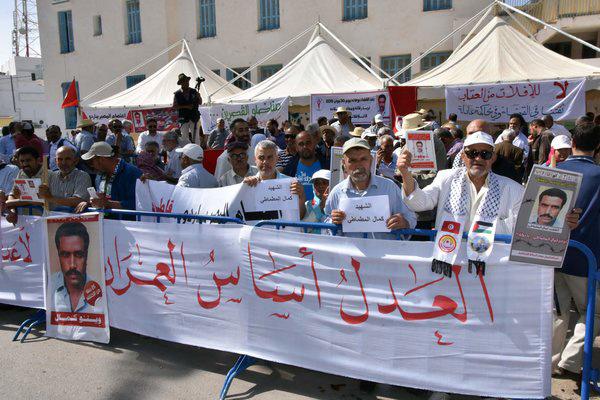You are here
Emotional scenes as Tunisian dictatorship victims testify
By AFP - Nov 19,2016 - Last updated at Nov 19,2016
TUNIS — Victims of Tunisia's authoritarian rulers gave emotional testimony on Friday, recounting horrific stories of torture and rape, and moving many to tears on the second day of public hearings.
In a rare move for the Arab world, the Truth and Dignity Commission (IVD) is trying to deal with decades of abuse under successive dictatorships in an attempt to get Tunisians to confront the demons of their past, as well as to provide justice to those who endured the worst.
The hearings, which come nearly six years after the Arab Spring began with the Tunisian revolution, are being screened live on television.
Ridha Baraketi, whose communist activist brother Nabil was severely tortured before being killed and having his body thrown in a drain in 1987, called for the truth to come out.
"The wounds haven't healed, we haven't mourned, we cannot close the file," Baraketi told those gathered to hear the testimony.
IVD has tracked human rights violations committed between July 1955, a year before independence from France, and December 2013 when the fact-finding body was established.
The black years of rights violations in Tunisia cover the rule of Habib Bourguiba between 1957 and 1987, and of his successor Zine Al Abidine Ben Ali, who was overthrown in 2011.
Jamel Baraket, whose brother Faycal, a member of Islamist party Ennahdha, was tortured to death in 1991, demanded those responsible be held accountable.
"It wasn't like there were just torturers who carried out torture and it stopped there, there was a whole system with doctors [involved], ministers, leaders in the security apparatus," he said.
Nearly all the day's testimony centred on how the dictatorships worked like "entire machines" in order to protect the system.
"I really hesitated before giving this testimony," said trade unionist Bechir Laabidi.
But "I am convinced that history cannot be written by the historians of the court. Our history is falsified, it was written on demand," he said.
This testimony must "remain for our children, for our generation, for researchers who want to know the truth", said Laabidi, who was arrested and tortured for his militancy under Ben Ali.
The next hearing is scheduled for December 17 — six years to the day since street vendor Mohamed Bouazizi set himself on fire, prompting mass protests that exploded into the Arab Spring.
The last broadcast will be on January 14, the anniversary of Ben Ali's final flight from the country he dominated for more than two decades.
Related Articles
TUNIS — A Tunisian tribunal charged with healing the wounds of six decades of dictatorship in the North African country accused the state on
TUNIS — The commission tasked with healing the wounds of dictatorship in Tunisia has dug up accusations both against incumbent President Bej
TUNIS — A commission seeking justice for families of people who suffered torture and other rights abuses during decades of authoritarian rul

















